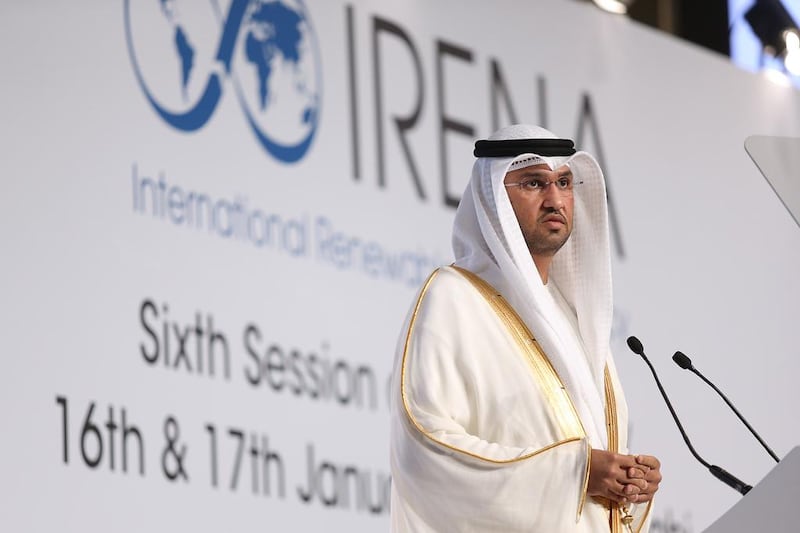The accelerating deployment of renewable energy after a historic climate deal will expand the global economy by US$1 trillion and create millions of new jobs, according to the International Renewable Energy Agency (Irena).
The Abu Dhabi-based agency issued a report yesterday in which it said that if the share of renewable power sources – including solar, wind and geothermal – in the world energy mix could be increased to 36 per cent by 2030, it would raise global GDP by up to 1.1 per cent – approximately the equivalent of $1.3 trillion.
The forecast follows a universal and legally binding climate deal signed by 195 countries in Paris last month. The agreement, to come into effect in 2020, sets forth an action plan to curb climate change by keeping any rise in temperatures below 2 degrees Celsius. To do this, an acceleration of renewable energy and energy efficiency measures will be required. Already, 164 countries, including the UAE, have renewable energy targets in place.
“Thanks to the growing business case for renewable energy, an investment in one is an investment in both,” said Adnan Amin, Irena’s director general. “That is the definition of a win-win scenario.”
The "Renewable Energy Benefits: Measuring the Economics" report was released at the sixth session of the Irena General Assembly, a two-day event held in Abu Dhabi ahead of the World Future Energy Summit in the capital that opens on Monday.
The renewable energy job market will more than double from 9.2 million global jobs currently to more than 24 million, Irena said.
“This analysis provides compelling evidence that achieving the needed energy transition would not only mitigate climate change, but also stimulate the economy, improve human welfare and boost employment worldwide,” said Mr Amin.
To drive those targets, the bulk of financing – about 85 per cent – will derive from private investment. “We believe that public financing will remain at approximately the same share [of investments] at 15 per cent,” said Rabia Ferroukhi, the head of the knowledge, policy and finance division at Irena. “This will be necessary to trigger private investment in the sector.”
While the government percentage of financing may remain the same, the overall sector has grown substantially. Last year clean energy investment rose 4 per cent to its highest amount at $328.9 billion, according to Bloomberg New Energy Finance.
The head of Saudi Arabia-based Acwa Power, Paddy Padmanathan, last month told The National that the private sector was the main driver of the power sector.
“Governments aren’t investing a great deal of capital. As we switch more to renewable energy, the investment capital continues to increase,” he said. Mr Padmanathan expects the Saudi firm’s business across the Middle East and North Africa to grow 20 per cent year-on-year.
Abu Dhabi’s Masdar has announced that to meet rapidly rising demand in the Mena region to 2030 it would double its solar and wind energy portfolio over the next 10 years.
Saudi Arabia’s Abdul Latiff Jameel group, which is currently involved in 18 countries, including operations and solar projects in the Middle East, North Africa and Turkey is “actively seeking strategic partnerships in the renewable energy space”. It “will also look to collaborate with energy experts and government initiatives on opportunities around power production and conservation”, said Roberto De Diego Arozamena, the chief executive of the Dubai-based unit Abdul Latif Jameel Energy and Environmental Services.
Irena’s Mr Amin said that the energy transformation that will take place would not be based on individual projects, but rather a “holistic approach to developing an entirely new energy system”.
He said: “It will be as revolutionary as mobile telephones were for the telecommunications industry.”
lgrave@thenational.ae
Follow The National's Business section on Twitter





